Peter MALONE
Saturday, 09 October 2021 12:59
Australian Dream, The/ 2019
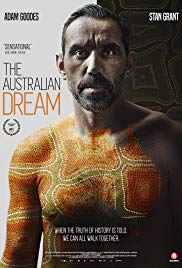
THE AUSTRALIAN DREAM
Australia, 2019, 105 minutes, Colour.
Adam Goodes, Stan Grant, Nova Peris, Gilbert Mc Adam, Michael O'Loughlin, Paul Roos, John Longmire, Tracey Holmes, Linda Burney, Nicky Winmar, Nathan Buckley, Natalie Goodes, Brett Goodes.
Directed by Daniel Gordon.
The Australian aborigines have the Dreaming. For those who came later to the land, there is always the reshaping and re-hoping of The Australian Dream.
Adam Goodes, AFL star, Brownlow medallist winner, Australian of the year 2014, is the subject of two 2019 documentaries, The Final Quarter, shown on television, and this film which has a commercial release.
It is a film which is significant for all audiences in Australia.
Initially, a collage of images and episodes indicates the controversial nature of the film and opinion divisions in Australian society about Adam Goodes, his aboriginality, his response to racist responses and insults leading to continued booing during his play, especially in 2014 and 2015, and the criticisms of his being named Australian of the Year.
For those who admired Goodes as a talented player and for those who do not know much about him, the first part of the film is an excellent tribute to his talent and skills, telling excerpts from a variety of games. It is in this context that we see him as Australian of the Year, hearing his speeches, focusing on his background as an aboriginal Australian, Australian aboriginal, and the challenge to long attitudes of racism, the challenge to fairness and justice.
Goodes agreed to be interviewed for this film which gives him an opportunity to reflect on his upbringing, lack of knowledge about being aboriginal, his gradual learning, doing courses, becoming more articulate on the issues, the affirmation that he received in the first decade and more of his football career, it also ships, the shock and disappointment of the insults, the wear and tear of the continued booing harassment, the psychological consequences, the growing disenchantment with AFL.
The narrative of the film was written by Stan Grant who also appears significantly offering comment on Goodes himself and his experience with excerpts from significant speeches that he gave on these issues, speaking from the inside and his own experiences as a national and international journalist.
There are also many interviews, the strong presence of Adam Goodes’ mother, his marriage to Natalie and her support, a variety of football personalities, inside racial and political views by Nova Peris and Linda Burney, strong comment by sports television personality, Tracey Holmes.
All strong dramas have a significant villain – and, in this film’s case, media commentator, Andrew Bolt, with excerpts from his television programs, serves as a devil’s advocate concerning (with critical attack) Goodes. And, there are glimpses of an unwise fool in television personality Sam Newman. Eddie McGuire? comes out on the side of the angels, but not without some thoughtless comments, but with some apologies.
The film, and Stan Grant, have created a challenging atmosphere for the Australian viewer, an experience of being alerted to and then being appalled at so much inherent racism, the faces and shouts of abusers, the gross inarticulate bombast of so many tweets that are shown on screen, and video of a sting racist rant.
So, the two films serve as a means for an Australian examination of conscience – and can lead to a profound challenge to Australian consciousness.
Published in Movie Reviews
Published in
Movie Reviews
Saturday, 09 October 2021 12:59
Gunman's Walk
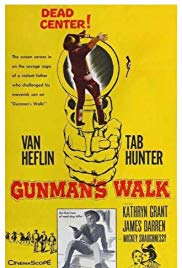
GUNMAN’S WALK
US, 1958, 97 minutes, Colour.
Van Heflin, Tab Hunter, Kathryn Grant, James Darren, Mickey Shaughnessy, Robert F.Simon, Ray Teal, Paul Birch, Will Wright.
Directed by Phil Karlson.
During the 1950s there was a proliferation of westerns, often small-budget, star vehicles for actors like Audie Murphy, Randolph Scott, Van Heflin. They often came from the Universal Studios or Colombia, with contributions from Warner Brothers.
These westerns, often supporting features, did in fact offer stories that were dramatisations of the conventions of the West, the Cowboys, the gunslingers, the clashes with the Indians. Because of their straightforwardness and the interesting themes, they have lasted longer in the public consciousness, on television and other means of streaming, than many of the more big-budget and upmarket feature films of the period.
This is one of the better ones, starting steadily with establishing the relationship between two brothers, the older Tab Hunter and the younger James Darren, and their relationship with their patriarchal father, owner of the cattle spread, Van Heflin. Gradually other themes are introduced, a touch of romance, prejudice against the mixed breed and the condemnation of “half-breeds�. There is a cattle run, the older brother killing one of the mixed breed, moving to a court case, the work of the local sheriff, the judge, the prosecutor, attempted justice in a context of racial prejudice.
The racial prejudice theme runs through the film, the patriarch being particularly bigoted and forbidding his son to romance the young Sioux woman, Kathryn Grant. This is particularly strong in the court case. There are other themes of the carrying of guns, the changing of the West, the role of the sheriff, quick draws and shootouts, posses.
Ultimately, the father has to confront his son, admit that he is a failure as a father, wanting to shape his son, the son being like his father but wanting to outdo him. It is inevitable that the father shoots the son, quicker on the draw.
Interestingly, the film ends with the father breaking down and weeping, respecting his younger son and the Sioux woman, not quite the usual ending of a Western.
Of interest is Quentin Tarantino’s liking of this film and promoting it, especially after Once Upon a Time in Hollywood with his faded TV star, Rick Dalton (Leonardo Di dear Tarantino admires the film and suggests that this character played by Tab Hunter would have been the ideal character for Rick Dalton to play at the end of the 1950s. Tarantino also admires director Phil Karlson who directed The Wrecking Crew, featuring Sharon Tate, which is significant in Tarantino’s film.
1. A solid Western from the late 1950s? The range and cattle setting, the town, law and order? Family issues and rival sons? Race issues and bigotry? Combined well into the narrative?
2. The Western setting, the open plains, the mountains? The town, the streets, bars? Law court? The musical score? The theme song about the runaway? Whistled, and singing it in the bar?
3. The title, the middle of the street where gunplay took place?
4. The introduction to the two brothers, Ed whistling, Dave silent, the clashes? Riding, meeting their father? Calling him Lee instead of Dad? His patriarchal approach, authoritarian, yet genially loving his sons, especially Ed, wanting and to be like him?
5. Lee, the past, guns, gunfighter, shooting the Indians? His pride and boasts? Seeing him as a shooter? Expectations of his sons? Testing Dave and his shooting? Ed and his success but risks? The household? Bob as his assistant? The plan for the cattle drive? The recommendation of the Sioux? His taking them, praising them? Yet his prejudice?
6. Ed, older, sombre, his relationship with his father, wanting to be like his father, wanting to be better than his father? Wanting his father’s praise? With Dave, his bigotry, the encounter with Cecily and his flirting? Her rejecting him? The white horse, the pursuit? With Cecily’s brother and the other men? Edging Paul to the cliff, his falling and dying? How deliberate? Or rivalry? His denials? The reaction of the sheriff? Defiance? His father defending him? The experience in court? The witness – and the revelation that he was a horse thief and swindling Lee? His going out on the town, with the girls, singing the song? The issue of wearing the gun in the town? Letting Dave go? The sheriff putting the assistant on his tail? Their discussions? The horse thief, riding through, and seeing the white horse, challenging him, shooting out of his hand, shooting him? In the bar by himself, the barman’s fear, the men not coming in? Confrontation by the sheriff, going to get his shotgun, Lee taking Ed’s gun? His defiance? In jail, pretending to hang himself, shooting the assistant in cold blood, the escape, his father finding him, the frank talk, the effect on Lee? Lee wanting to be better, drawing on his father, his death?
7. Dave, younger son, not wanting to wear the gun, his father testing him and is failing, the encounter with Cecily, the attraction? Ed and the white horse and the promise? Paul’s death, Lee giving him the money for Cecily, going to see her? In the court? Her throwing the money back? His going to see her, the Judge and his wife encouraging her? His wanting to stay with her, not go on the posse, not go with his father? Trying to break through bigotry.
8. The brothers, Sioux, the cattle drive, the death? Testimony in court, their being despised because of mixed breed? Cecily, her testimony, throwing the money back? Cecily and the attraction to Dave, not forgetting that it was Ed’s brother, the walk, her supporting Dave against his father?
9. The agent, the law, the case, the prosecution? The witness, his story about witnessing the accident? And talking to him, the promise of 10 horses, his taking the white horse, Lee knowing that he was a thief? His being shot? Recovery?
10. The judge, the handling of the situation, attempts at justice, yet the difficulties of racial prejudice?
11. The finale, Lee and his discoveries about himself, his failure as a father, the return to the town, with Dave and Cecily, his breaking down and
weeping? The audience left with this image?
Published in Movie Reviews
Published in
Movie Reviews
Saturday, 09 October 2021 12:59
For the Sake of Others/ El Mal Ajeno
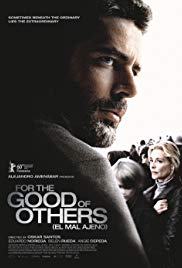
FOR THE SAKE OF OTHERS/ EL MAL AJENO
Spain, 2010, 107 minutes, Colour.
Eduardo Noriega, Belen Rueda, Angie Cepeda, Clara Lago, Marcel Borras, Carlos Leal.
Directed by Oskar Santos.
This is a medical melodrama, a portrait of a doctor – but the film also has mystical overtones.
Spanish star, Eduardo Noriega, is a doctor working in a hospital, separating from his wife who also works there, tensions with his daughter. However, he is dedicated to his work, rather unemotional on the surface, but intense.
At the opening of the film, the audience is introduced to a range of people suffering from severe diseases, trying to cope, the doctor listening. One of the patients is pregnant and appeal to the doctor for help. The story is revealed, rather complicated, a man leaving his wife because he wanted children, the ill woman becoming pregnant, his confronting the doctor and shooting him in the parking area before shooting himself.
But the point of the film is that the doctor is not wounded. In fact, when he treats people, they become well again. He does not understand, is approached by the former wife of the shooter, trying to learn what is happening to him.
So, the film combines familiar material from hospital wards with personal and relationship crises – and the tantalising possibility that healing is possible beyond medical attention.
1. The title? Healing? Medical, psychological? Healing power and compassion?
2. The settings, the city, homes, hospitals, wards, surgeries? Roads, highways? The musical score?
3. The introduction, the collapse of the group, the individuals, from one to the other, the details of their illness, audience alert?
4. The doctor, his personality, dedicated, his life, tense relationship with his wife, with his daughter? Separation? His being isolated? His assistant and the clash? His wife in the hospital, her work, the daughter and her behaviour?
5. The range of staff, respect, the young doctor, the clash with the older man? His attitude? With his daughter?
6. The situation with the woman, ill, pregnant, in hospital? The man, leaving his wife, wanting children? The situation and her recovery?
7. The man and his psychological state, anguish, confronting the doctor, shooting him, shooting himself? The doctor, recovering, no wounds?
8. The mysteries of the doctor, the increasing exercise of his healing power, the range of people healed, the responses?
9. The wife of the dead man, the background of her marriage, separation, the mistress, her pregnancy? The doctor and his visits, sharing? The visit to the pregnant woman, the consequences?
10. The effect on the doctor, physical, psychological? With his family? Able to heal others – but himself?
11. Reconciliations, forgiveness, healing possibilities?
Published in Movie Reviews
Published in
Movie Reviews
Saturday, 09 October 2021 12:59
Night of the Wild Boar
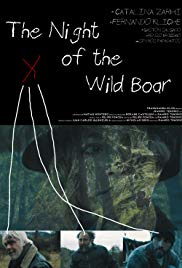
THE NIGHT OF THE WILD BOAR
Speaking, 2016, 75 minutes, Colour.
Catalina Zahrii, Renzo Briceno, Fernando Kliche, Gaston Salgado.
Directed by Ramiro Tenorio.
This is quite a brief thriller, requiring the attention of the viewer, noting the different time eras the action.
A novelist is being interviewed about his works with a criticism that they capitalise on actual murders of young women. He is also our asked about the influence of the woman who is his partner. Then, it emerges that he himself has been murdered.
The main action of the film takes place in the village, the wife returning from her travels, making connections with the worker who runs her estate, suspicious of the man that he has hired, encountering the policeman from the past who is investigating the death of her husband. In the meantime, there is also an investigation concerning a dead woman.
The film relies on atmosphere and intrigue, the role of the woman and her stories, her writing, her influence on her husband – the uncovering of her motivations, the wilful ambitions of the policeman and his wanting to do a deal with the woman in writing up further stories and his getting the reputation as an author.
Offbeat, intriguing, but requiring attention to follow.
1. Brief Spanish melodrama?
2. The title, the explanation of the eating of the boar, the boar and what it ate, the consequences for humans?
3. The town, homes, countryside, farms? The scenery, the woods? The musical score?
4. The mystery, the town, the murders of the women, the novels and their descriptions? The interview with the author, the cross-examination, his being blamed for the murders? The question about his partner and her influence?
5. Claudia, the return to the town, her past, travels, writing? Her relationship with her boyfriend? The mystery of his death? His novels, people blaming him for the murders? Claudia, her personality, aloof, her relationship with Mario and his work for her? Is implying Sebastien, Sebastien chopping the wood, her wariness of him? Benno, the relationship with the past? His investigation?
6. The mysterious interactions of these characters? Suspicion of Sebastien, his house, all the details of the novels, the revelation about the death, his wanting vengeance? His death?
7. Mario, life in the town, subservient to Claudia, the revelation about his doing what she asked? His being wounded, death?
8. Benno, dissatisfied, the investigation, suspicions, the past with Claudia, the confrontations?
9. The revelation of the truth, Claudia and the murders, her hold over her boyfriend, his writing the books? Benno and his wanting to be an author, wanting her to commit the crimes and writing them up, his being a celebrated author?
10. The atmosphere, the complexity of the plot and characters, the final revelation?
Published in Movie Reviews
Published in
Movie Reviews
Saturday, 09 October 2021 12:59
Humanity Bureau, The
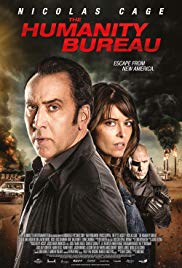
THE HUMANITY BUREAU
Canada/US, 2017, 95 minutes, Colour.
Nicolas Cage, Sarah Lind, Jakob Davies, Hugh Dillon, Vicellous Shannon,
by Robert W. King.
The Humanity Bureau itself is not humanitarian at all. The setting is the latter part of the 21st-century, Earth becoming barren, people trying to survive in the deserts of Nevada with minimum food and water yet trying to build up communities.
Nicolas Cage, a bit more humane than in the many thrillers made during these years, is an agent of the Bureau, seen in visiting people, threatening them, telling them they must go to a special retirement place, Eden. It is revealed that this is the equivalent of a future concentration camp and the agent knows this. We see him also visiting a young woman who has to be reassessed for her contribution to the community. She has a young son, hyperactive.
The agent is also supervised by the authorities and is in line for promotion – except, that he cares for the woman and her son and sets out to help them escape to Canada. There are various adventures on the way, isolated communities who in fact to help with petrol and provisions while they are pursued by the authorities.
There are some unexpected revelations about the boy and his relationship to the agent.
On the one hand, there is a somewhat pessimistic ending in terms of deaths – but the agent having secreted a USB stick with subversive information coming into the possession of Native American ranges in Canada and the Humanity Bureau being exposed.
1. The title, the irony in the betrayal?
2. A post-apocalyptic world, 80 years from the present? The 21st-century story?
3. The scorched earth, barren, the radiation? No growth, no crops, contaminated water? The experience of deprivation? The credible scenario?
4. Nevada, the desert atmosphere, the roads and highways? Old homes? The contrast with the contemporary city, high buildings, offices? The landscapes of Montana, the border with Canada, snow and the seasons, the musical score?
5. The situation, the role of the government, totalitarian, fascist and deceptive, the creation of New Eden? The brochure, the contrast with the reality, deportation, ovens and destruction, millions killed?
6. The focus on Noah, his role, working for the government, knowing the truth? Driving in the desert, the contemporary communications, Adam and his assistant, the supervisors? The rules of authority and accountability?
7. Noah and the old man, the landlord trying to sell water, the motel, talking with the old man, his refusal to go, his getting the gun, the shots, his death? The ticket? Giving an account to the authorities? Noah’s potential promotion?
8. Noah, the surreptitious meeting with the man in the elevator, something subversive, Adam confronting the man, the death of his family?
9. Rachel and Lucas, their life and style, the community, school, the music and the recital? The interview, contributing to society or not? Lucas, being contrary, the interview with Rachel, the back of the truck? Noah’s reaction, giving 24 hours for the audition, his being present?
10. Noah and his decision, Lucas and his fall, in the truck, fleeing, trying to get provisions, the man at the gas station, impeding the progress of the authority cars? The woman, supplies, her giving information? Attacked by the group, the outlaws, support, encourage to go to the border? The testing of the radiation?
11. The revelation of the truth about Noah and Rachel, Lucas as his son, Rachel as the neighbour, the mother’s death, her caring for Lucas not telling him the truth?
12. Adam, bureaucrat, the authorities, the pursuit of Noah, the confrontation, the bargain, Lucas saved, Noah giving him the souvenir? The deaths of Rachel and number?
13. The Canadians, native, rangers, the attack, shooting Adam and the others, rescuing Lucas?
14. The memory stick, Noah and is speech about revolution, its playing on the television, the people rising up?
15. A successful revolution? The future?
Published in Movie Reviews
Published in
Movie Reviews
Saturday, 09 October 2021 12:59
Amanda

AMANDA
France, 2018, 107 minutes, Colour.
Vincent Lacoste, Isaure Multrier, Stacey Martin, Ophelia Colbert, Marianne Basler, Jonathan Cowan, Nabitha Akkari, Greta Scacchi.
Directed by Mikhael Hers.
Amanda is quite an agreeable French film focusing on a little girl, focusing on family. The little girl is Amanda.
She lives in Paris with her mother, the father long gone. Her uncle, her mother’s brother, is an agreeable young man, doing odd jobs, welcoming tenants to apartments, tree surgeon… He has bonded very well with Amanda.
The uncle cycles around Paris which gives the audience many opportunities to have views of the city.
The film reflects on contemporary terrorism and Amanda’s mother is killed – with dilemmas for the uncle and whether he is prepared to take responsibility for Amanda’s upbringing, visits and care from his father’s sister, but his mother has long since disappeared and returned to England.
Her mother had intended take Amanda to London to meet her own mother and to go to Wimbledon. In fact, after going to various schools and agencies, uncle and Amanda go to London, make contact with the mother (an effective Greta Scacchi in a cameo role) and go to Wimbledon – with some hopes for their future.
1. The title? The focus on the young girl, her life, tragedy, experiences?
2. A French film about family and family issues?
3. Paris, the city, David and his bike riding, the vistas of the city and the sights? Apartments, school, hospitals? The trip to London, the parks, Wimbledon? The musical score?
4. The title, yet the focus on David, as uncle, his role in the family, Amanda and her dependence on him?
5. David and his situation, his age, the range of jobs, the rentals and welcoming guests, tree surgeon? His personality? Memories of his dead father and cutting his children off from their mother? The mother in the UK, his not knowing her? His aunt, relying on her for Amanda? His relationship with his sister, the bonds between them, with Amanda? Lena, her arrival, liking her, a genial man?
6. Sandrine, as mother, the father disappeared, loving her daughter, bring her up, happy sequences, dancing together? Her relationship with her aunt, relying on David? The suddenness of her death, terrorists and massacres? Impact? Her plans to take Amanda to Wimbledon and see her mother?
7. Lena, piano teacher, from the provinces, meeting Amanda, with David, the injury, in hospital, wanting to be alone? Going back home, David’s visit, the sexual encounter, the bond between them?
8. Amanda, her age, at school, play, the effect of her mother’s death, accepting it, weeping, relying on David, the visits to Maud?
9. The issues of adoption, David meeting with the authorities, the discussion, his weariness, not wanting to take responsibility? His visit to the special school and the explanation of the regime?
10. David, getting advice, his injured friend, the partner, the discussions, going for the walk?
11. The challenge to David, the prospects? The decision to go to England, travelling by train, in London, the bike ride, enjoying the city?
12. The park, his mother’s arrival, their talk, introducing her to Amanda, possible bonds, time for explanations?
13. The scenes at Wimbledon, the tennis, Amanda weeping, David and his explanation, her joy, waiting for the end and the victory?
14. The final sequences, people in ordinary life – foreshadowing the future?
Published in Movie Reviews
Published in
Movie Reviews
Saturday, 09 October 2021 12:59
Hello Ladies
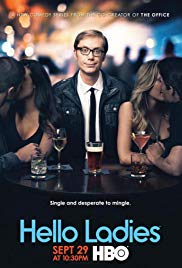
HELLO LADIES
US, 2014, 80 minutes, Colour.
Stephen Merchant, Christine Woods, Nate Torrence, Stephen topple off ski, Nicole Kidman, Carly Craig, Crista Flanagan, Kevin Weisman, Kyle Mooney, Adam Campbell.
Directed by Stephen Merchant.
Hello Ladies is a television film derived from the television series of the same name, produced in 2013. It is the work of British comedian, Stephen Merchant, who stars in the series and the film, and also directs. His appeared in a number of comedies, sometimes with Ricky Gervais, very tall, capitalising on being tall and gangly as well as being awkward, creating awkward situations, but also getting out of them with ingenious humour.
Hello Ladies is the line that he and his friend, Wade (Nate Torrence) use when they meet women in bars or at socials. It really works – although the awkward Wade encounters a lonely, somewhat heavy, woman in the bar and they hit it off instantly and completely.
In the meantime, Stephen Merchant’s Stuart is living in Los Angeles, sharing an apartment with Jessica (Christine Woods). She is a would-be actress and there is a humorous sequence where she does an audition for a yoghurt commercial responding to the hyper- demands of the director. She decides to give up acting and Stuart advises her to go back to college – which she eventually does.
The film is very episodic, drawing on the television series, Stuart and Wade and their encounters, other friends, especially one who is the adviser to a millionaire, played by Stephen Tobolowsky, preening on his yacht.
There is a complication when Stuart’s former girlfriend comes from London with her fiance and he takes them to a party when Nicole Kidman is present. Nicole Kidman proves herself a good sport in playing along with Stuart’s intrusive demands that they have a conversation to indicate that they are friends so that he will impress Jessica and the friends from London. They would also like a photo and, again, Nicole agrees to help. The night is a great success.
Stuart is basically lonely, awkward with women, has a one night stand with Jessica and thinks that they can date – but she puts him off. Life goes on, Stuart meandering through it. Eventually Jessica invites him to her 31st birthday party (the film opening with her 30th). He attends, feels out of place – but, he explains to Jessica his percentage theory of relationships, whether percentagewise one is comfortable with the other person compared with the lower percentage of antagonism! This seems to provide a basis for Stuart and Jessica being together.
Very slight, a comment on the dating scene, worth catching the Nicole Kidman episode, and an opportunity to see Stephen Merchant’s comic style – which he capitalised on in his feature film, Fighting with the Family.
Published in Movie Reviews
Published in
Movie Reviews
Saturday, 09 October 2021 12:59
Handsome: A Netflix Mystery
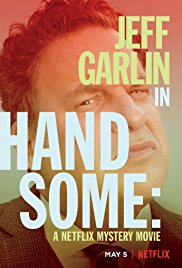
HANDSOME: A NETFLIX MYSTERY
US, 2018, 80 minutes, Colour.
Jeff Garlin, Steven Weber, Christine Woods.
Directed by Jeff Garlin.
This is a very slight murder mystery produced for Netflix – not with the same quality as Murder Mystery with Adam Sandler and Jennifer Aniston.
The success for this film as a very slight time-passer is the response to star, writer, director, Jeff Garlin. He is a rather large Detective, supervising a squad of mixed talent and untalent. And he has his own problems in relationships – and with food.
What makes a difference is that the smarmy actor played by Steven Weber announces to everyone at the opening of the film that he is the killer. So, the audience has to be alert to his presence, the plausibility of his being a murderer, what he did, how we did it, how he was exposed.
The plot involves a babysitter who is something of a flirt, who is murdered, her body rearranged on the actor’s lawn like a Star of David. There are quite a number of clues which Handsome and his squad follow-up, some comic turns, and a final set up where Handsome infiltrates the actor’s house, uses a clue about the distinction between creams and lotions (the difference is water in lotions), taunting the actor about a poor early performance – which is what the babysitter did and led to her murder.
A very average time-filler.
1. A brief murder mystery? Made for Netflix audiences?
2. Audience enjoyment, the murder situation, the setup, the investigation and the clues, the range of police staff and their interactions with handsome? Handsome himself? The solution? The need for audiences to identify with Handsome and his idiosyncrasies?
3. The actor, the beginning and his identifying himself as the murderer? The effect for the investigation and audience reaction?
4. Handsome, his size, manner, refusing cookies, his weight, taking them home, giving them to the neighbour? His skills? His problems? The range of his team and consulting, their offering hypotheses, ridiculous, suggestions? Their involvement?
5. The babysitter, his encounter? Her being murdered, the body on the lawn, the Star of David?
6. The investigation, the range of suspects, the movie background, stars and celebrities, advertising, the differences between creams and lotions? This being important for the plot solution?
7. The character of the actor, his vanity, creams and lotions, his body, the murder weapon? The flashback, the babysitter and the sexual
encounter, her laughing at his performance, his anger? His being taunted by Handsome about his performance and his anger?
8. The setup, the interview with the actor, going to his room, the challenge, the locked door, the police entry, his being trapped?
9. A slight time-passer?
Published in Movie Reviews
Published in
Movie Reviews
Saturday, 09 October 2021 12:59
Dear Ex
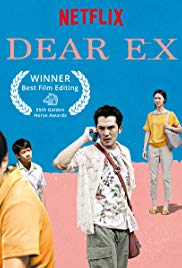
DEAR EX
Taiwan, 2018, 100 minutes, Colour.
Roy Chu, Ying- Xuan Hsieh, Spark Chen, Joseph Huang.
Directed by Kidding Hsu, Mag Hsu..
This is a Taiwanese film, winner of several awards, serious themes and some comic touches. While it played well locally, it perhaps is too much immersed in its culture and may not travel so well.
The basic theme is how to handle complexities of sexual orientation.
The film opens with a wife complaining loudly (very loudly) when her husband dies. The issue is the inheritance of his insurance and the beneficiaries of his will. He has come out to her and left her to live with a young lover and has named him as the beneficiary. The wife is upset for herself but also for her teenage son – who is somewhat rebellious and clashes with her throughout the whole film.
As the film goes on, the lover becomes more sympathetic, doted on by his mother, looking after the husband after he left his family, especially during his illness. They have been associated with theatre and in the background there are rehearsals for and a performance of a musical called Bali.
The teenager does want to sort out his situation, knowing the orientation of his father and accepting this, wearied and wary of his mother’s constant complaints, going to stay with the lover who really wants him to leave.
The film illustrates the emergence of themes of homosexuality and orientation in Asian films as the 21st-century developed.
Published in Movie Reviews
Published in
Movie Reviews
Saturday, 09 October 2021 12:59
Nobody's Fool/ 2018
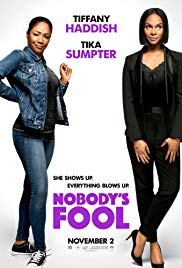
NOBODY'S FOOL
US, 2018, 110 minutes, Colour.
Tiffany Haddish, Tika Sumpter, Omari Hardwick, Amber Riley, Whoopi Goldberg, Missy Pyle, Chris Rock.
Directed by Tyler Perry
Tyler Perry has quite a strong reputation in producing and directing films especially for an African-American? audience. He also often acts in his own films as well as in other films, even taking on the role of James Patterson’s Alex Cross.
However, this film was not successful in reaching his target audience. In fact, it is rather difficult to sit through.
The film gives top billing to Tiffany Haddish, the stand-up comedian who emerged in such feature films as Girls Night, Night School. In this film, she plays a rather overbearing character and plays it overbearingly, just out of prison after five years, avoiding meeting with her mother, Whoopi Goldberg, going to live with her fashionable sister, a successful advertising executive. She is played rather glamorously by Tika Sumpter.
Also in the act is a reformed alcoholic and addict, Omari Hardwick, who runs a coffee bar, offering complimentary drinks to the executive. Tiffany Haddish comes on strongly and gets a job, interfering with her sister’s life, interfering with the manager’s life. They have a one night stand with consequences for an up-and-down relationship which, we know, will end satisfactorily.
The main complication is that the executive is in a phone relationship with the ideal man – ‘n investigating group establishes that she has been “catfished� (which includes a cameo by Chris Rock) and the man doesn’t exist. However, he does turn up and there are complications with the bar owner.
One of the pleasures of the film is seeing Whoopi Goldberg again doing a sassy turn as the women’s mother.
Not the best of Tyler Perry’s films.
Published in Movie Reviews
Published in
Movie Reviews